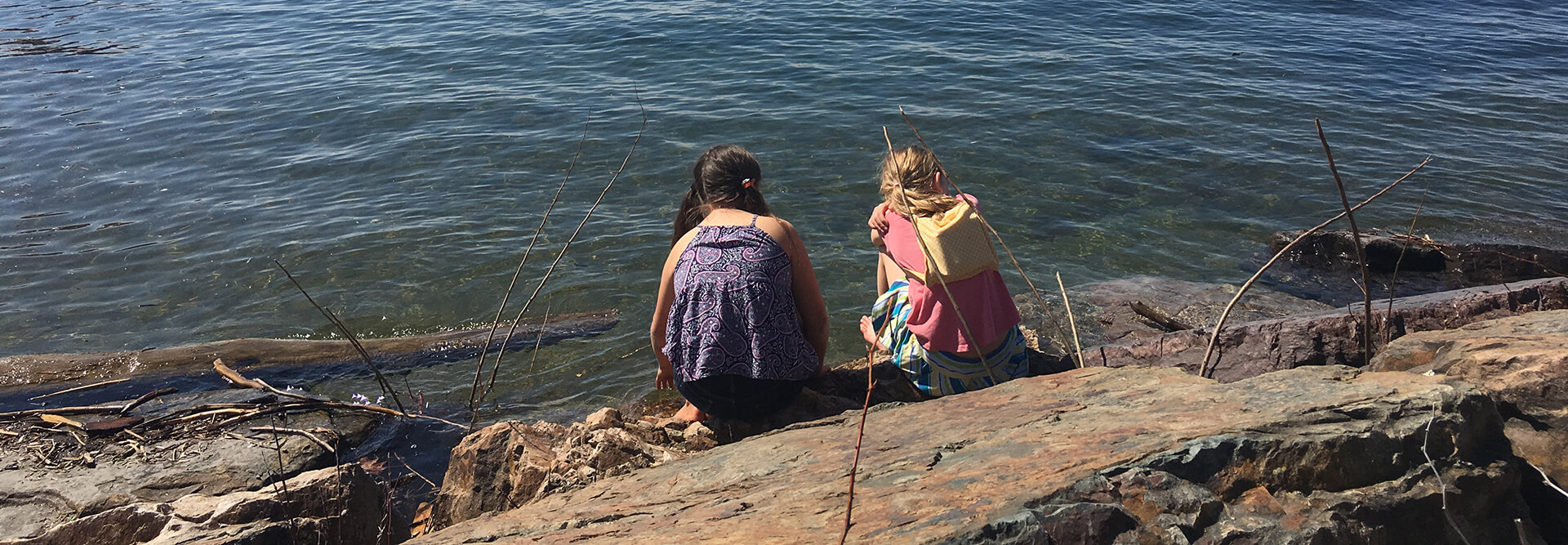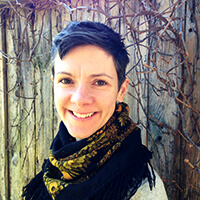A tiny practice between my unschooled daughters and me has been growing stronger. It’s a bedtime meditation, a simple, short, and, it turns out, fertile and powerful couple of moments before drifting off to sleep. It arose from an inspiration for bringing intention with my eldest daughter, nine years old, to ground, feel the support of the earth and universe, and reframe her intense reactions and upsets as assets of her sensitive, attuned, big heart.
The meditation has shifted into a time to breathe into heartspace and gut, expanding beyond the safe limits of everyday life and acknowledging how the body is responding to the day. In these moments of breathing into the body, tending familiarity with its sensations, patterns, loudness, bigness, shut down-ness, I suspect we’ve stumbled into a practice of radical resistance. I notice active resistance, from all of us, to social messages to take up less space, make others comfortable, accept guilt, keep going at all costs, focus on external cues. I feel us practicing descending from the mind into the truth of the body; claiming time to slow down; protecting space to open into wider awareness; enjoying peace (or accepting pain). It’s a brief focus in the day that changes so much.
As I’ve been exploring this sort of deeper embodiment, staying aware in my body in the moment, with the kids, a thread has emerged that fascinates me. More deeply anchored into my physical experience, various school scenes from throughout my life that had previously seemed unrelated pop into view, strung together to form a cohesive picture, like memories where the side blinders are gone. They go together and make sense, and position a bigger picture that is coming into focus: school denies the body in order to accomplish what it sets out to do.
**
My husband mentioned matter-of-factly that he remembers one year in school, second grade, there was a single bathroom that was inside his classroom. The kids in his class didn’t have to ask permission, the teacher just said they could go when needed. Other than that one year, he said, he learned how to just never pee at school so he could avoid asking to go. Our unschooled kids blinked at this preposterous situation. It was their confounded reaction that caught my attention. Here are two people who think it’s nuts to ask someone else if you may pee, and cannot imagine fear of the bathroom. This gave me pause. Of course, I completely related to my husband. I inwardly recalled some scary things that happened in my middle school girls’ bathroom—probably not daily, but even just a few times of knowing a girl was assaulted by other girls squatting on toilets hiding in neighboring stalls is enough to be afraid of going in to the bathroom every single time. I still check for feet under each bathroom stall and listen to hear if someone is hiding.
**
My seven-year-old daughter is a self-identified Professional Cuddler. The kid loves to cuddle, snuggle, be swung around, give and receive consoling hugs. She whispers worriedly to me that she wants to stop growing up, because she is afraid that soon I won’t be able to pick her up and carry her around. Dacher Keltner writes that “some Western cultures are pretty touch-deprived, and this is especially true of the United States. If you go to various other countries, people spend a lot of time in direct physical contact with one another—much more than we do. One of my favorite examples is a study from the 1960s by pioneering psychologist Sidney Jourard, who studied the conversations of friends in different parts of the world as they sat in a café together. He observed these conversations for the same amount of time in each of the different countries. In England, the two friends touched each other zero times. In the United States, in bursts of enthusiasm, we touched each other twice. But in France, the number shot up to 110 times per hour. And in Puerto Rico, those friends touched each other 180 times!” I picture my daughter in school, first grade, sitting at a desk, with a single adult and a huge group of kids, for six hours a day. Equally troubling, thinking of her on the playground, where play and bullying, friendship and touch (or not) are being played out amongst peer-segregated groups of kids who have been told to keep their hands to themselves all day long. I call to her, “How many hugs a day do you think is the bare minimum for you at this age?” She runs over to me with a huge smile and a generous hug. “Infinity.” She doesn’t budge on her estimate when I press her for a ballpark minimum.
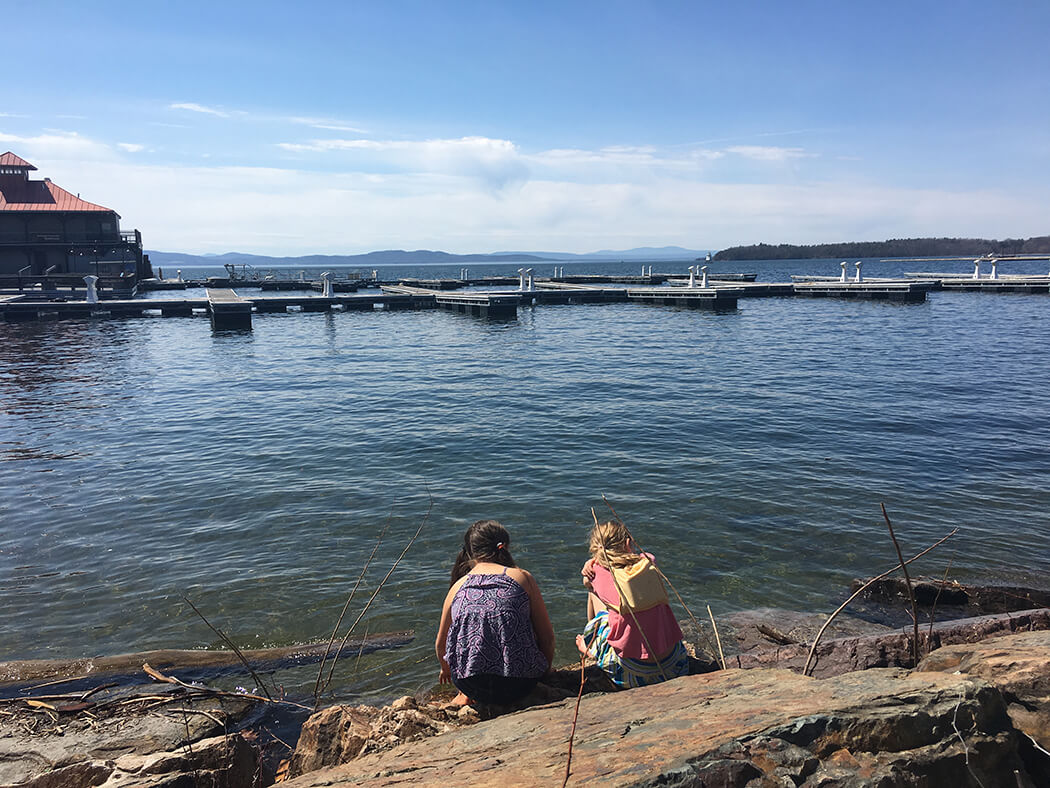
**
“Hands to yourself.” “Quiet hands.” “Personal space.” “Listen with your whole body.” “I like how [perfectly attentive child] is sitting.” “No running.” “Second warning.” “Walking feet.” “Eyes on me.” I learned these phrases and used them in elementary classrooms, pretending it is normal and respectful to say strange commands to other people about their bodies and their touch. This weird edu-speak naturally crept into my parenting language. I somehow ignored that this is institutional language, developed to keep large groups of children controllable, replacing the paddle threat of last century with modern “nicer” psychological verbal tools wielded by the adults upon whom children depend. Mindlessly celebrating small kids being still, silent, controlled, responsive to conditional approval. Pretending that stilling the body has no effect on the freedom of the mind to think.
**
While signed up on the substitute teacher list, I got called a number of times to be a paraeducator (helper) in an autistic classroom. Elementary aged autistic kids were being desensitized to the sensory irritation and distraction of their clothing and environment by the teachers pinching clothespins on their clothes, which they were forced to leave on during the day, including as they moved about the building. I think about those little ones and their bodies. To have a disability that makes tags, uncomfortable fabrics, hard, sharp edged chairs a physically painful experience, and learn that others have the power to further your misery utilizing deep embarrassment and coercion. That for your body to fit in a school, you must submit in such an essential way. I think about the non-autistic kids, still at an age of theta (dreamlike and hypnotic) brainwaves, seeing that bodies that have different movements and needs than their own walk around school with ridiculous clothespin torture and adult supervisors. It’s uneasy to know that I related with the non-autistic kids who just look; I’m one of the kids relieved it’s not me. The kid I was tries to stay small and unnoticed; to care about the clothespin kids but not bring any attention to myself by asserting outrage, or extending a hand.
**
I made friends with some really wonderful teachers. I lucked out and got a job in a rural, progressive public school, with an involved, remarkably creative, and innovative community. The people I worked with genuinely cared and went the extra mile for individual students, their classes, families. I recognized in them qualities of a number of friends of mine from college and felt familiar with the intelligence, creativity and caring. It seemed like part and parcel of the job that any worthwhile teacher is truly burned out and working hard way beyond any version of sustainable health: this exhaustion is just accepted as a part of the job of being a “good” teacher. By the end of the day on Friday, I drove home numb, my mind and body exhausted. I swore that this weekend I would get ahead; this vacation I would work harder and then things could be more sustainable. I began to wonder, a tiny bit, what it would be like for a decent person to just show up, and be present with children they cared about—how could this not be enough? But so many kids needed so much to thrive in the school—the good school. All the other teachers, in whom I saw myself, kept staying late, doing more, going above and beyond—maintaining a hyper vigilant work ethic. So did I.
**
A few years into teaching, I read some Zen stuff about mindfulness. I had resolved to check in with how I felt inside of my body once a day. After about a week, it seemed odd to me that I hadn’t had time to check in, even once a day, for days on end. At the end of one day I rushed to get a bathroom break, before my afterschool enrichment job, and sat on the toilet remembering I wanted to take deep breaths and ask myself “How do I feel?” I had no idea how I felt; I couldn’t ascertain how my body felt. A deep breath or two later you could have knocked me over with a feather. I was surprised to realize my entire body and mind were incredibly stressed and locked up. I told myself I had every reason to be pleased in my life. I had no rational understanding of my inner distress, only that it was real and I had become aware of it. It would be a decade later before I recognized that my jacked-up nervous system was a perfect match to the high achieving kids I had taken classes with as a student and to the teacher communities I kept choosing; all of us were trying and working so hard.
**
When my girls were two and four years old, still at home with me, I was on the board of education at the local K-8 school. I called the school to volunteer and get a sense of what was going on. I was a teacher and musician, and offered to come to the band room where the teacher, universally, is overwhelmed and trying to do a thousand things on no budget. I lugged my horns and both kids in for a few weeks and helped the appreciative band director with band lessons. Each of my kids had a mouthpiece to blow along on and generally found the situation fascinating. One week, when we arrived, the office let me know the band director was absent and asked if I would teach the band lessons. With my two toddlers. Predictably, I readily agreed, and an administrator with a key let us into the band room. Before she left, she advised that if the school went into emergency lock down, I would not have a staff key, which is required to lock the band room door and keep an intruder out. Instead, we should hide quietly in the back of the room. I vaguely pictured my eager-to-please and easily terrified four-year-old shaking, my two-year-old with my hands smothering her mouth, hiding behind a bass drum. At the end of the afternoon of lessons, I packed my horns and kids up, signed out at the office, and the receptionist buzzed us out of the antechamber. The door locked behind us, a thousand people inside, silent from the other side of the shut door. My little kids looked up at me, and I felt we had escaped from prison. I let myself breathe into a huge amount of stress in my chest, noted the plastered smile on my face, hugged my girls, and said, “Let’s get out of here. We can do ANYTHING. What do we want to do?”
**
Now we unschool, so I translate the things my kids do as part of their everyday life into school subjects that are required to report to our state agency of education. This bit of indebtedness to the state in terms of my children’s learning has the effect of keeping alive in me an old meter that positions striving, effort, and external validation against ease, flow, presence, and enough-ness. Sometimes we have a day that feels so deeply aligned, so full of happiness, peace, and cooperation; we are in the flow. We are connected and it’s easy and pleasurable to be in the moment and in the body. There is not a deadline or a bell to interrupt. We value this deep-dive feeling so much that we will just cancel plans to continue on. Playing at our friends’ house one day in the depths of winter, a group of kids get busy outside. Some find a fallen tree in the deep snow and pretend they are competing in the Olympics in an imaginary tree vaulting competition; other kids are Nature Rescue Fairies and are serious in their work digging up buried tree branches to free to the sun. There is a standoff between the Olympians and the Nature Fairies, but disaster is averted and they move on. I am sent to make my way back to the house for a “very sharp kitchen knife” and marvel that my work at this phase of life is to snowshoe about, retrieve a knife and wonder what it might be required for (cutting a particularly stuck cedar bough), visit with a wise friend, be outside in daylight on a weekday. Happiness. We finish the day hungry and tired, the kids a bit cranky, but full and complete. The old teacher in me mentally reviews the day to locate some subjects that can be documented for the state, but often, as this day, nothing we did really “counts.” I feel the “full and complete” inside of me shifting into a “not enough, must do more” vacant feeling. I breathe into my compulsion to think about how tomorrow we should do schoolwork of some kind to balance out this happiness. I can recognize this popping up of old beliefs as a layer of my deschooling that has already seen some cracks and even chipping away, but some remains to be witnessed, hopefully released. After a couple breaths I discern an underlying belief peeking through, but it’s new to me and hard to name. I have a fuzzy awareness of the relationship of deservedness, school, production, and feminine knowing. I’ve been at this deschooling for four years and there is always another layer; the work is ongoing. I can’t make sense today of this layer and wonder if it will come into clearer view at some point. Maybe an essay to sort it out, next year? Back to a breath for “not enough, must do more” and seeing if the happiness of my day can reemerge as body-feeling, I remind myself that I don’t need to solve the impossible equation balancing flow, ease and fulfillment with striving, exhaustion, pushing and force. Today was enough; we are enough.
**
The kids are cross with each other, snapping at me, and I am tuckered out, an introvert with too much stimulation. The kids have watched too much on the iPad, I have too much to do, the house is a mess and the chicken coop needs help. I want to be alone but also see my friends. The kids and I inevitably have conflict, some days a lot more than others. It is uncomfortable and I want to yell at them not to be assholes. Sometimes I do. I breathe and try to remember we are having a lot of practice of how to be in relationship, including when we are frustrated. When things cool off, we chat briefly about how it felt in the body to be mad, unheard, yelled at, yelling, hitting a sibling, being hit by a sibling. They agree with each other, seriously, about how bad it feels to be powerless and small, and to feel invisible. I try to listen and maybe remember feeling this way myself, with feelings pushed down deep. Younger sister mentions her screams got stuck in her heart and throat again and hurt there. They tell me the worst thing is when Mommy screams at you, and you are so mad, but Mommy is also the one who you need to give you a hug to feel better. They nod in agreement; that it is an impossible situation.
**
My girlfriend takes her eight-year-old homeschooled daughter to the afterschool girls’ running program at their large elementary school. Her daughter wants mom to walk her in to the classroom where the group meets. The school says they will “let” the mother in. Over a cup of tea she mentions to me how anxious, stressed, shut down she feels inside as she walks her daughter through the hallways. She hasn’t been in a school in a while and neither have I. We sip and think about how the buildings are set up, the windows and locked doors, the “behavior room” door that has taped on it a thick folder of discipline forms with a complete list of offenses and little checkboxes next to them. She talks about the requirement for permission from the school for a mother to enter. The kids walking in lines as bells ring. A few weeks later, the school tells the mom that now it’s time for her eight-year-old to come in on her own. Mom should not enter the building but leave her child at the door and wave. We talk another time about that choked, stressed, red flag feeling, also the feeling of ignoring the body’s messages, and harm.
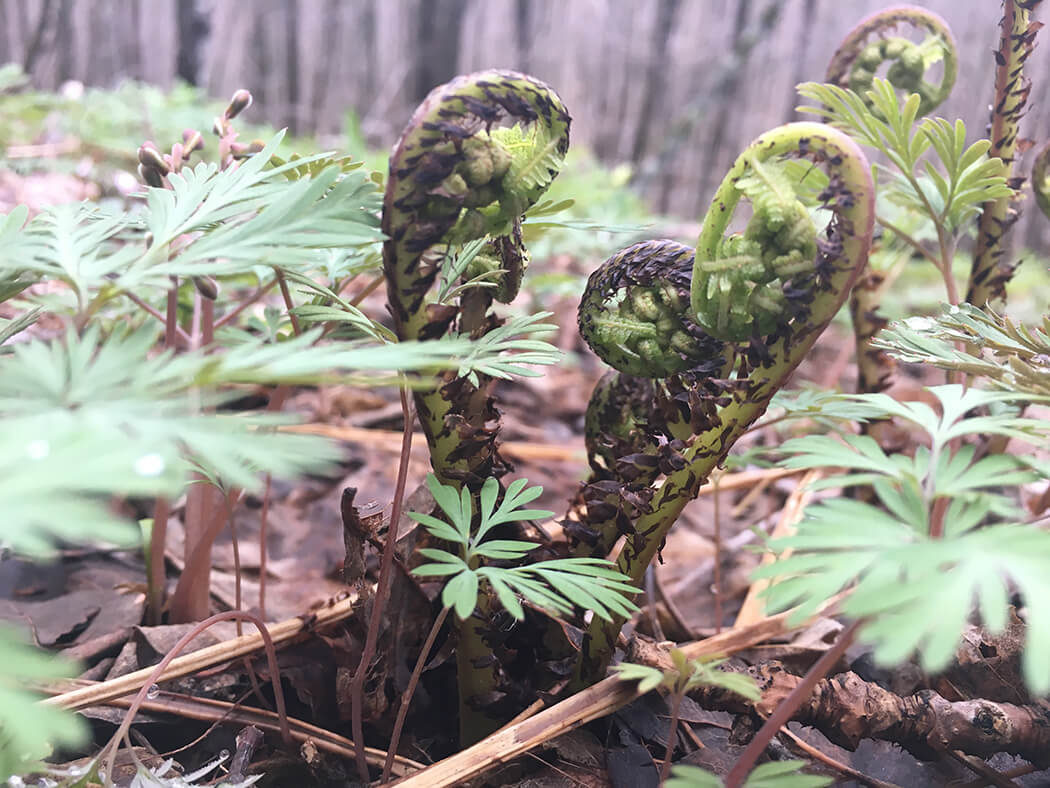
**
Everybody goes. School reflects and imparts the dominant culture, beginning at a time of childhood that the brain is still operating in theta brainwaves, a dreamlike, hypnotic state. The child accepts the interpretations of the world around her from the adults; the messages she receives on all levels inform her brain’s assessment of her environment and world, which in turn informs how her brain and embodiment proceed.
From the vantage point of unschooling and embodied mindfulness, I take stock and see that many moments of discomfort point to a culture of mind and body dissociation. School is a powerful and intentional driver of the norms of the dominant culture, and an early-childhood, government-enforced experience of disembodied institutionalization. In addition to the trauma of premature separation from family, young children are removed from the cultural nervous systems of their families and local communities and inserted into the cultural nervous system of a school. The trauma of being separated from family is then compounded by an institution whose nature is to further separate the child from his own young body: forced sitting, walking in lines, not being permitted to leave the room or building, raising an arm in the air before speaking, asking permission to take care of bathroom needs, regulated eating, clothing, shoe, and hair requirements, and a virtually complete lack of movements that engage the bottom half of the body (laying, bouncing, squatting, swinging, dancing, tumbling, climbing). Schooling centers intellectual efforts (such as verbal acuity, early reading and writing, test taking, memorizing things temporarily, and performative and extrovert qualities) and posits them as universally important, rather than what they are: the culturally relative values of white colonialism.
Modern schooling is a result of its own origins as a government policy, and the cultural context in which it exists. School is not special or uniquely guilty in denying the body; rather it is a reflection of white colonialism’s ancestral history, in which unconscious trauma plays a central role. School as a system seen within its context is revealed to be infatuated with intellectualism. It gives itself permission to pretend that obsession with rational thought, intellectual pursuits, and the mind is normal, and the body can be denied. School permits itself license to perpetrate silencing of the body in the service of the mind. Children are in school under threat of police force. The majority of schools have an armed “school resource officer” constantly in the building. The jacked-up nervous system of a teacher’s room doesn’t arise from a place of intentional harm, but is the natural extension of many (well-meaning) teachers’ collective experience in a schooled society. The kids and teachers who win at school are largely unable to reflect on the position of school within white colonialism, to reflect on or find support for their unending hyper vigilance, nearness to burn-out, constricted and stressed-out nervous systems. Adults seek outlets for this dissociation of body, mind and spirit. Without reflection and practice, the children in our lives can naturally serve as recipients of our unconscious pain and the rationalization and projection of this mind-body separation.
The liberation of my own truth, healing, and re-embodied knowing is directly linked to honestly feeling what is happening inside of my body. I have to feel it to come to self-ownership of the ways in which I deny the embodiment of those with less access to power than me, including children. Recognition and tending the awareness of what is playing out on the internal landscape of my body itself is key to recognition and tending awareness of the role of marginalization and oppression in my relationships.
It is a big feeling to sit with these connections between childhood, school, culture, history, parenting, and oppression. The price for me to deny them was too big to keep going. I couldn’t hold these feelings and stay in a school system, I couldn’t find any peace in replicating that system as school-at-home. I’m relieved to be letting myself to relate to people as a person-without-a-lesson-plan. People comment admiringly, “It must be a lot of work to be your kids’ homeschool teacher!” Go ahead and breathe a sigh of relief with me; I dodged a bullet there. Mostly I don’t have plans for what my kids’ heads need to learn. There is an amount of space I need to back up physically and energetically to meet them within an open space where we can be ourselves and connect. I can hear them and see them (and myself) better from here. I know there is a tradeoff to ignoring the need for this space where we can each stay in possession and awareness of our own bodies. And I can easily let myself fill the space completely, taking up my own space and theirs as well. I can get them to do some things if I take up that space, tell them what they have to learn, shift into hyper vigilance about practicing the damn fiddle. Then arises the hefty price—I am pushing her to step into the jacked-up nervous system, the rushing around, the conflict over whose needs matter more. Breathe...It’s safe to just stop, and find a more peaceful path.
I desire to contribute from a place of feeling and knowing the absolute possibility for change. Being familiar with the inner struggle to continue on in the system myself, I hold this possibility for change especially for folks who are still in schools and feeling that dissonance in the gut. I know what it is to be both deeply invested in schools and feel internally that it cannot continue at this pace and cost. The investment was, after all, made into a system created for perpetuating a dominant culture of which I am a primary benefactor as a white person—and in which I participated with an uncomfortable mix of reluctance and enthusiasm. The body has so much to tell from these cues of reluctance and enthusiasm. The space I am living at this moment is a place where moms are talking honestly about the pressures we feel for getting “it” right, doing and being “enough,” looking like we have our shit together—while simultaneously feeling unwilling to pass this same paradigm on to our children. For me the new paradigm that is emerging is one with time and space for the body (mine and yours) to be honest. In all its messages and patterns of pleasure, discomfort, expansiveness, pain, curiosity, hopefulness, tiredness, tightness, yearning, aliveness... The new paradigm is our bodies, alone and together, in this present moment as much as we are able. The new paradigm simply does not have space for school, reformed or not, in a government building, inside my own home, or inside my body, and that’s all right.
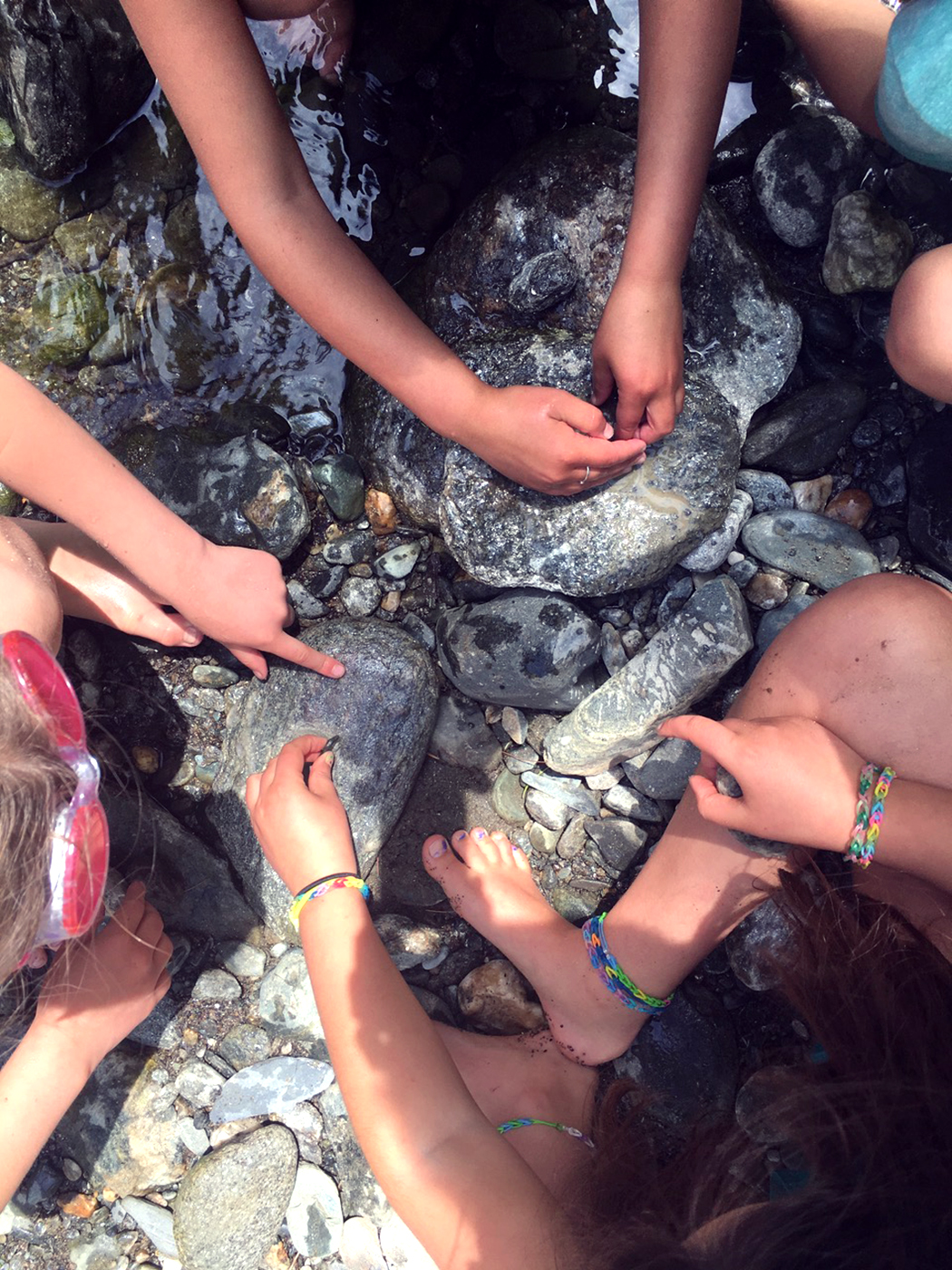
If you enjoyed this article and feel called to give back to ASDE, here are ways you can support our work:
- Donate money
- Share our content with others! Click one of the buttons above to easily share on Twitter, Facebook, or email.
- Consider becoming a Contributor for Tipping Points
Tipping Points Magazine amplifies the diverse voices within the Self-Directed Education movement. The views expressed in our content belong solely to the author(s). The Alliance for Self-Directed Education disclaims responsibility for any interpretation or application of the information provided. Engage in dialogue by reaching out to the author(s) directly.


